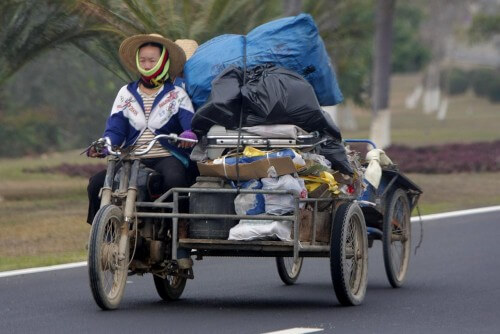The high-speed trains in China not only carry people - they also affect the spread of the SARS and swine flu epidemics in the country. Get to know the less pleasant side of modern transportation
Dr. Daniel Mader, Angle - news agency for science and the environment

A less publicized side of the issue of transportation and the environment is the spread of diseases and epidemics through transportation. Without transportation between distant areas, the chances of an epidemic spreading from one area to another are low and limited by the physical environment. Bird flu, for example, has a greater potential to develop into a global pandemic because we have limited control over infected birds that are flown around the world.
Although, even without modern human transportation epidemics and diseases spread. The Spanish warriors of Hernán Cortés overcame the natives in the New World with the help of gunpowder, but also with the flu and measles bacteria they brought with them on the ships that carried them from Europe. Even the most well-known historical epidemic - the one that struck Europe and destroyed a third of the continent's inhabitants in the 14th century - originally came from another country, China, where it caused extremely severe morbidity. This health disaster probably hastened the collapse of the greatest empire the world has ever known - the Mongol Empire, which ruled over large areas from Korea in the East to Eastern Europe.
The Mongols, thanks to being skilled horsemen, were able to control most of Eurasia. The fast transportation routes (at the time) that opened up between the different parts of the empire are the ones that led to the spread of this from the source of the epidemic in China, to Korea, India, along the Silk Road to the Caspian Sea, Uzbekistan, Persia, the Middle East and to Europe. It is ironic that the transportation that enabled the expansion of the Mongol Empire ultimately led to its end.
Bipolar effect
Medieval transport spread epidemics slowly, over years and decades. But today, with the help of cars, trains, ships and planes, diseases and epidemics spread across the globe at an unprecedented speed - within weeks, days and even hours. Thus, for example, global epidemics such as SARS, MERS, influenza and Ebola have spread rapidly in recent years.
Researchers in China Checked recently How the modern Chinese transportation network affects the spread of epidemics in the country. The study examined how epidemics such as SARS (severe acute respiratory syndrome) or swine flu (H1N1 swine influenza) spread in the transportation system that connects 116 cities with over a million inhabitants. This transportation system is mainly based on high-speed buses and high-speed trains. The quality of the transport infrastructure has a decisive effect on the spread of epidemics within such a transport system. The hypocritical results are that an increase in the frequency of travel (thanks to developed infrastructure) increases the spread of epidemics. However, the speed of travel has a bipolar effect: on the one hand, fast travel reduces congestion, crowding, meeting points between people and stops in the various means of transportation - and therefore reduces the level of contact between people and the risk of the spread of epidemics; On the other hand, fast and comfortable travel leads to an increase in the number of trips and the number of destinations - and thus to an increase in the risk of the spread of epidemics.
This research, which contributes to our understanding of the ways in which diseases spread in modern transportation systems, can help countries contain and prevent the spread of epidemics in their territory, or even find ways to change their transportation systems in routine and emergency situations during an epidemic.
